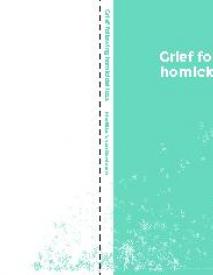Grief following homicidal loss
Homicidally bereaved individuals have to deal with the notion that their loved one
is deliberately taken from them: the death is caused by the premeditated action of
another individual, most often unexpected. While the psychological consequences
for the people left behind are assumed to be great, few studies systematically
examined psychopathology following homicidal bereavement. The aim of this
dissertation was threefold. First of all, adaptation to homicidal loss was examined,
predominantly in terms of CG symptoms and PTSD symptoms (Chapter 2 and 3).
The second key aim was to look closely at revenge following homicidal loss; first
by examining the association between dispositional and situational revenge on the
one hand and CG, PTSD and positive functioning on the other hand (Chapter 4), and
second, by examining the association between negative cognitions and avoidance on
the one hand and CG, PTSD, anger and revenge on the other hand (Chapter 5). The
third point of this dissertation was to evaluate a combined treatment of EMDR and
CBT for homicidally bereaved individuals (Chapter 6). This final chapter will provide a
summary of the findings, thereby answering the research questions underlying this
study. The summary will be followed by a discussion of the main findings, along with
description of the limitations and several suggestions for future research.
Geachte bezoeker,
De informatie die u nu opvraagt, kan door psychotraumanet niet aan u worden getoond. Dit kan verschillende redenen hebben,
waarvan (bescherming van het) auteursrecht de meeste voorkomende is. Wanneer het mogelijk is om u door te verwijzen naar de bron
van deze informatie, dan ziet u hier onder een link naar die plek.
Als er geen link staat, kunt u contact opnemen met de bibliotheek,
die u verder op weg kan helpen.
Met vriendelijke groet,
Het psychotraumanet-team.
173 pagina's | {Groningen} : Rijksuniversiteit Groningen
ISBN 9789036793865 ; Supervisors: Prof. dr. A. de Keijser ; Prof. dr. P. A. Boelen


